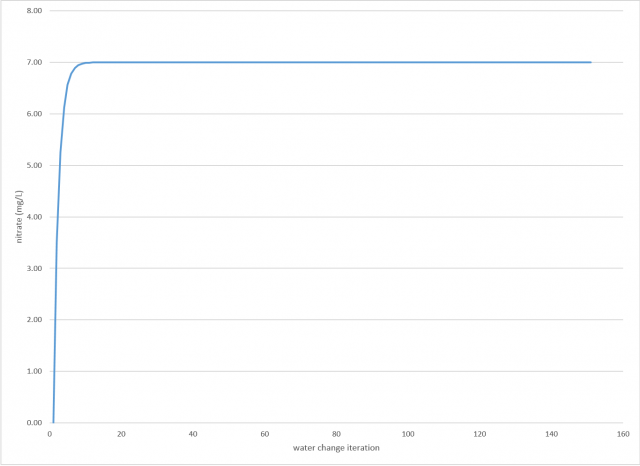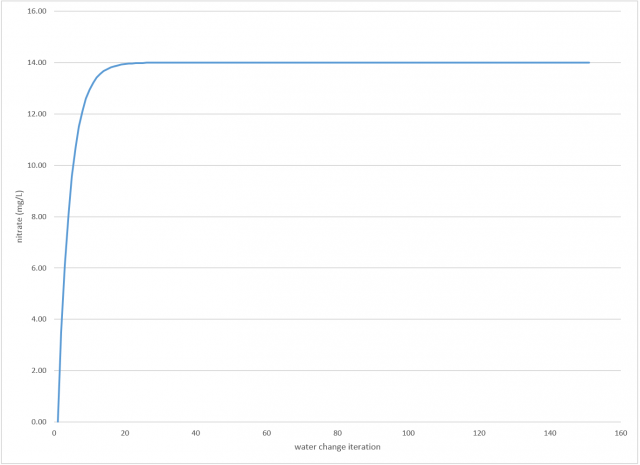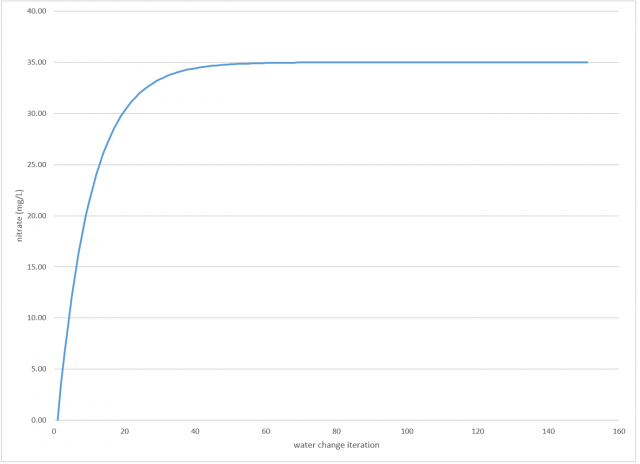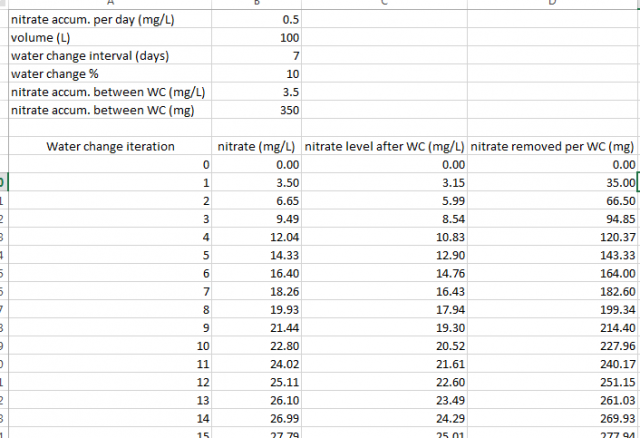What's more effective. Frequent smaller water changes or single huge ones?
- Thread starter FINWIN
- Start date
You are using an out of date browser. It may not display this or other websites correctly.
You should upgrade or use an alternative browser.
You should upgrade or use an alternative browser.
damage, I do not be leave what you say about nitrate creep, again as always IMHO, lets say you have a 100g tank, base line is 0. in a week your nitrate has creeped to 100ppm. you remove 25% of water, and replace, you are now at 75ppm, next water change you are at 175ppm, change 90% and you are 10 ppm, creep next water change well be 110ppm. understand what I am saying? while you are removing nitrate you are not removing it all just as much as you can with fish in. so you are slowly concentrating until you replace it all at some point to bring it back down to base level of 0 or as close as you reasonably can. nitrate is finite, once all is dead no longer fueling the process it stops.
There's no study that found damage to internal organs at 23 mg/L nitrate. There are some fake studies and some taken wildly out of context though.
As for nitrate "creep," this can be modeled.
For simplicity's sake, a 100 L tank with 0.5 mg/L increase in nitrate per day.
50% water change every 7 days:

25% water change every 7 days:

50% water change every 30 days:

10% water change every 7 days:

They are all asymptotic, even the lazy 10% per week schedule. Nitrate will not go up indefinitely. Why? Because at some point you will be removing nitrate at the same rate it's being added.
Ten percent weekly:

350 mg of nitrate added between water changes.

And at some point, 350 mg of nitrate will be removed each water change.
so, seems you are saying that nitrates no matter what they are do not hurt fish?
Nitrate levels in aquariums are unlikely to ever be high enough to harm fish. I've never seen or heard of someone with 400+ mg/L nitrate once let alone for several months.
I find this to be bad advice IMHO, Take care Sir.
You've been wrong about everything so maybe you're the one giving out bad advice.
Pops et al, if you replace nitrates, with poor quality water, does it make more sense?
Nitrates should basically only be used as a measuring tool, not the be all to end all regarding water quality. For the vast majority of hobbyists it's simply MUCH easier to test for nitrates, vs dissolved organic compounds, bacteria, pathogens, etc.
Does that help put things into perspective?
Nitrates should basically only be used as a measuring tool, not the be all to end all regarding water quality. For the vast majority of hobbyists it's simply MUCH easier to test for nitrates, vs dissolved organic compounds, bacteria, pathogens, etc.
Does that help put things into perspective?
I find the whole nitrate subject very interesting, mainly because I don't fully understand it.
The ammonia test we do tests for ammonia, and the nitrite test for nitrite. Both are very bad and we aim for 0ppm on both, always. Pretty straightforward on those two.
I naively thought like the vast majority of other hobbyists that the nitrate test simply give us an indication of nitrate. We've learnt that nitrate isn't as bad as the other two so we have a bit of leeway. The fact that the acceptable nitrate level can differ depending on who you talk to, from single low figures ppm up to say 40-50ppm makes it a grey area of acceptability.
And now we're learning that nitrate really isn't a thing after all, it's the build up of other stuff which the nitrate reading only alludes to, that is the real reason we need to freshen our water up by water changes.
Calling it the "nitrate" test, to me now, just seems outdated. What else would you call it though? And then, taking us straight back to the age old problem, what acceptable ppm would you put on it?
The ammonia test we do tests for ammonia, and the nitrite test for nitrite. Both are very bad and we aim for 0ppm on both, always. Pretty straightforward on those two.
I naively thought like the vast majority of other hobbyists that the nitrate test simply give us an indication of nitrate. We've learnt that nitrate isn't as bad as the other two so we have a bit of leeway. The fact that the acceptable nitrate level can differ depending on who you talk to, from single low figures ppm up to say 40-50ppm makes it a grey area of acceptability.
And now we're learning that nitrate really isn't a thing after all, it's the build up of other stuff which the nitrate reading only alludes to, that is the real reason we need to freshen our water up by water changes.
Calling it the "nitrate" test, to me now, just seems outdated. What else would you call it though? And then, taking us straight back to the age old problem, what acceptable ppm would you put on it?
I find the whole nitrate subject very interesting, mainly because I don't fully understand it.
The ammonia test we do tests for ammonia, and the nitrite test for nitrite. Both are very bad and we aim for 0ppm on both, always. Pretty straightforward on those two.
I naively thought like the vast majority of other hobbyists that the nitrate test simply give us an indication of nitrate. We've learnt that nitrate isn't as bad as the other two so we have a bit of leeway. The fact that the acceptable nitrate level can differ depending on who you talk to, from single low figures ppm up to say 40-50ppm makes it a grey area of acceptability.
And now we're learning that nitrate really isn't a thing after all, it's the build up of other stuff which the nitrate reading only alludes to, that is the real reason we need to freshen our water up by water changes.
Calling it the "nitrate" test, to me now, just seems outdated. What else would you call it though? And then, taking us straight back to the age old problem, what acceptable ppm would you put on it?
Good points, perhaps it would be more applicable to call it something like a 'pollutant test', so we'd be measuring pppm. That said it's still a nitrate test I guess, so we're possibly getting into semantics. But your point still stands, if we called it a pollutant test maybe more people would take water changes more seriously.



